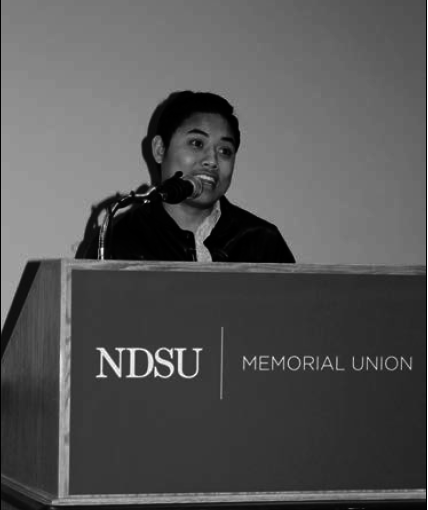What started merely as a writing project for Mrs. Leah Juelke’s English Learners (EL) language class, quickly turned into something much more. All it took was for Juelke to read her students’ harrowing stories of their journey to Fargo. Thus began a now four-year quest of increasing cultural awareness through sharing her students’ stories. She knew it couldn’t be her alone editing and reciting the stories. Their stories were much more poignant when shared by themselves, and the editing work was a great learning experience.
Fast forward four years to Mrs. Juelke’s class and their fourth volume of “Journey to America: Narrative Short Stories.”
In this short amount of time, the project has expanded to include students from Davies High School; for the second year in a row, they have presented at NDSU three times; their book is now part of the curriculum at Concordia and their books are available in physical and e-book format throughout the country.
This year, 35 Fargo South students and 15 Davies students participated in the program, with 19 sharing excerpts during the two-hour presentation at NDSU.
Many students were united in their experiences by mutual hate of airline food, excitement coupled with sadness when leaving for the United States and the difficulty adjusting to the cold weather. It was encouraging to see these similarities despite the students’ diverse backgrounds and paths to reach Fargo.
Some students fled a life as a child soldier alone without their families knowledge. Such was the case for Kokob Gebreyohannes who fled her home at 14 years old without her family’s knowledge. “Many people came to this camp (in Ethiopia) because the government of Eritrea was forcing kids to be child soldiers or were trying to kill them.”
Fellow students shared similar harrowing journeys such as senior Ntumba Lusamba, who fled to a refugee camp in Namibia after her family was attacked. The Katangese people did not want her ethnic group, the Kasaians, in her hometown. They entered her home and poured boiling water on one of her uncles and her grandfather.
It was no doubt difficult for Lusamba to voice her story, and she had to end her recitation early when she became overcome with grief. I believe everyone in attendance felt nothing but compassion and concern for the brave young woman who shared her difficulties with them. Upon reading her e-book on the class’ website, I found out that both her uncle and grandfather died of their injuries. The latter only a half mile from the refugee camp that was their destination.
Despite all of the difficulties these young people overcame to come to the United States and find themselves in Fargo, they seem like bright, hardworking students, many of whom speak multiple languages and look forward to jobs giving back to others. Doctors, nurses, soldiers and police officers were popular choices. They all seem not only to be adjusted to life in the cold northern reaches of the country, but are indeed thriving.
As Vietnamese student Van Tran summed it up, “At first I felt lonely and sad in Fargo because there were not a lot of Vietnamese people living there, probably because it is too cold for them. After awhile, people talked to me more and helped me understand. They showed me new things about their culture. I met new friends and joined some clubs too. It turned out the ‘North Pole’ wasn’t such a bad place to live.”
To read this year’s and past students’ short stories, visit http://ellfargosouth.weebly.com.
